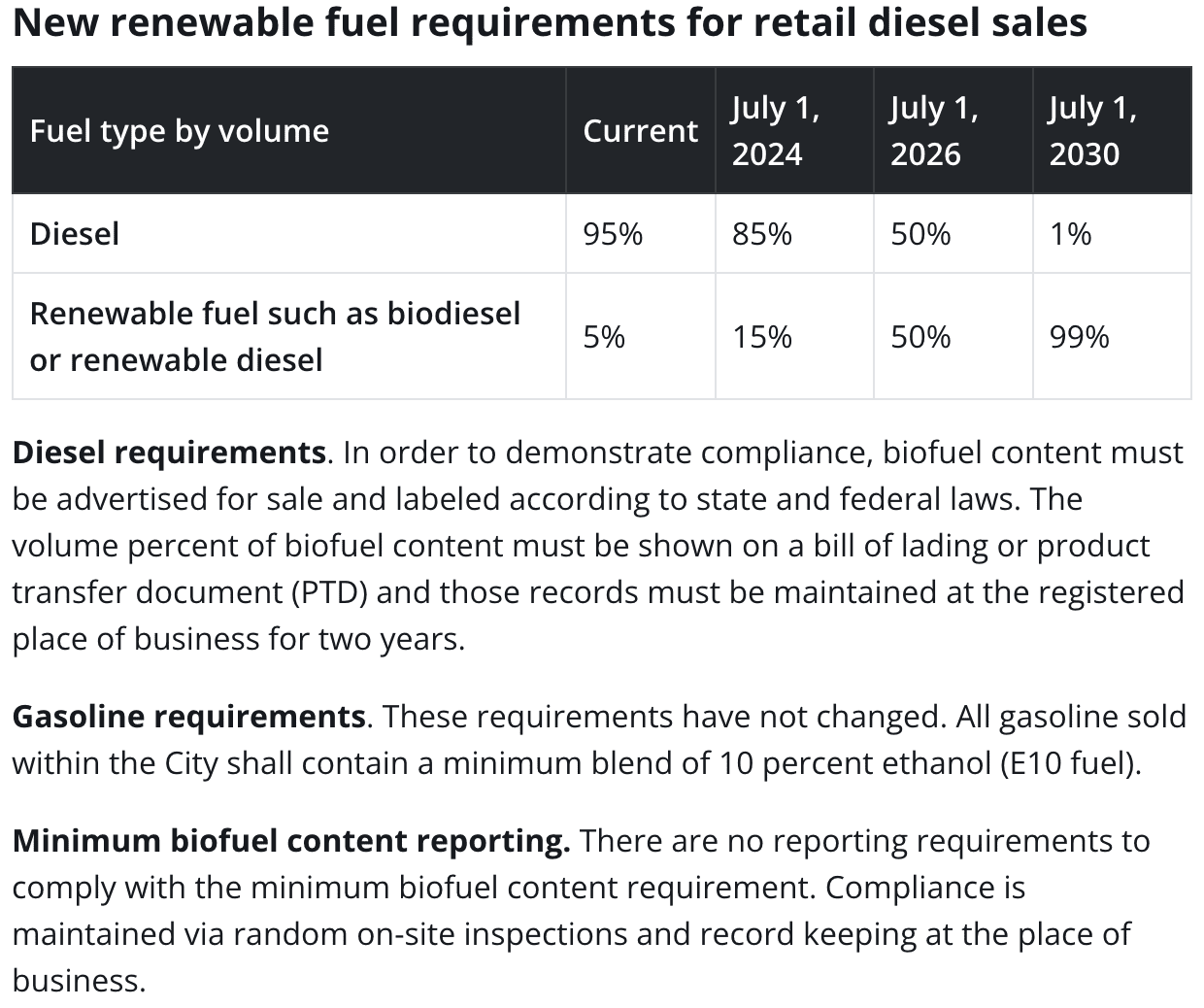Understanding The Renewable Fuel Standard In Portland
Diesel Fuel Is Changing In Portland With The Renewable Fuel Standard (RFS)

Figuring out what this means for you or your business can be challenging. We have shared many questions that we have been asked already, to help provide more clarity on what this Renewable Fuel Standard (RFS) means for Wholesale Purchaser-Consumers. If your question isn’t listed below, please reach out to Star Oilco so we can make sure your questions are answered!
Choose Star Oilco As Your Preferred Fuel Delivery Company
The Renewable Fuel Standard (RFS) is Portland City Counsel’s response to the City’s 2022-2025 Climate Emergency Workplan, which lists the City’s priority actions over the next three years.
On Dec. 7, 2022, City Council unanimously adopted amendments to the Renewable Fuel Standard, Portland City Code Chapter 16.60, which reduces dependence on nonrenewable fossil fuels, by increasing the required percentage of renewable fuels blended with petroleum diesel sold in the city of Portland.
This policy increases low-carbon biofuel blends, moving Portland’s diesel fuel mix to 99% renewable in 2030. This policy includes a carbon intensity standard to shift to fuels that are lower carbon across their entire lifecycle.
Starting July 1, 2024, Portland will require that all diesel fuel sold contain a minimum 15% blend of biodiesel or renewable diesel. This percentage will increase steadily over the next few years, reaching a minimum 99% renewable fuel requirement by July 1, 2030.
There are no reporting requirements for retailers to comply with this mandate. Instead, the city will enforce compliance through random on-site inspections and by requiring retailers to maintain records of the biofuel content of the diesel they sell.
- The policy speaks to “Covered Entities”
- Diesel Fuel Transaction within the City of Portland Oregon
- Fuel distributors, resellers, retailers, nonretail dealers, terminals, importers and wholesale purchaser-consumers are directly regulated by PCC Chapter 16.60 and referred to as “covered entities.”
- Wholesale Purchaser-Consumers: also know as WPCs are directly regulated by PCC Chapter 16.60 and referred to as “covered entities.”
Wholesale purchaser-consumer (WPC) is a category of entities that own or utilize diesel vehicle fleets and purchase fuel in bulk for delivery into a storage tank at their facility or directly into a vehicles fuel tank. WPCs are required to register with the RFS program.
A fuel distributor or common carrier delivers on road diesel to your facilities on-site tank such as:
- Bulk Tank
- Aboveground Storage Tank (AST)
- Underground Storage Tank (UST)
A fuel distributor delivers on road diesel directly into your vehicles also known as:
- On-Site Fleet Fueling
- Wet Hose Fueling
Yes, these rules apply to fuel for on-road motor vehicles. Fuels used for the following purposes are not covered by these rules:
- Railroad locomotives, watercraft, aircraft, and emergency equipment
- Dyed diesel for off-road vehicles
- Dyed diesel for furnaces, boilers, generators
- Propane and liquefied natural gas for vehicles
Wholesale Purchaser-Consumers are required to meet three primary components of the RFS:
- Biofuel Minimum Content Requirements,
- Carbon Intensity standard,
- Selecting a compliance option, and
- Record keeping.
Biofuel Minimum Content Requirements for Wholesale Purchaser-Consumers
- WPCs in the City of Portland are required to meet the minimum biofuel content requirements for all fuel they purchase for their vehicle fleet. Beginning July 1, 2024, all diesel purchased must include 15% biofuel content, from either renewable diesel or biodiesel. This requirement increases to 50% on July 1, 2026, and 99% on July 1, 2030.
- The biofuel content requirements will be enforced through random inspections of fleet facilities to see that they (1) have a contract in place with fuel suppliers that specifies that fuel meets the minimum blend requirements, or (2) verification of actual products purchased through testing or review of product transfer documents.
- All WPCs also need to be aware of the Carbon Intensity Standard in PCC Chapter 16.60.
- All biodiesel and renewable diesel sold in the City of Portland must have a carbon intensity equal to or less than 40g CO2e/MJ as certified by DEQ’s Clean Fuels Program, Approved Carbon Intensity Values.
- Carbon intensity requirements apply to biofuel blendstock, not the final blended products, which may contain a portion of petroleum-based diesel fuel at a higher carbon intensity.
Selecting a compliance option for Wholesale Purchaser-Consumers
- WPCs will need to select a compliance option by the start of the compliance period, July 1, 2024.
- Portland Bureau of Planning & Sustainability (BPS) will provide notification about selecting compliance options by May 31, 2024.
- To receive notification, covered entities must be registered with the RFS Program.
*Compliance option selection may be changed at any time during the compliance period after consulting with BPS. If a covered entity decides to change the compliance option during the compliance period, they are responsible for compliance under the new option for the full compliance period.
Record Keeping Requirements for Wholesale Purchaser-Consumers
Portland City Code (PCC) Chapter 16.60 and administrative rules requires that an invoice, bill of lading, shipping paper, or other documentation, referred to as “Product Transfer Documents” (PTD) must accompany each fuel delivery in the city of Portland. The administrative rules specify that:
- PTDs must include the type of renewable fuel, including biodiesel, renewable diesel, ethanol, or any blends of these fuels, and declare the volume percent of such renewable fuel.
- PTDs must comply with OAR 603-027-0430 (1) (a) which includes identifying the quantity, the name of the product, the name and address of the seller and buyer, and the date and time of the sale.
- WPCs using the Product Transfer Document compliance pathway must also ensure that fuel pathway codes issued by Oregon Clean Fuels Program are also included on a PTD associated with each delivery received by the WPC or have a contract with a fuel supplier specifying the carbon intensity requirements of PCC Chapter 16.60.




